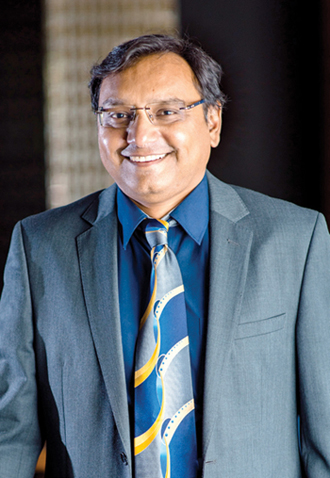Wise Advice That Changed My Life

Before one rises to fame, they are bound to face their fair share of hits and miss which eventually leads them to the top of the success chart. These people come with a deck of traits that sets them apart from the rest. Be it your parents, colleagues, managers, bosses, house helpers or for that matter anyone, they knowingly or unknowingly teach you the virtues of life. And if you have an open mind, it won’t be difficult for you to comprehend those teachings and apply it in your various walks of life. Agreed, work is just one part of your life, but it is something on which your livelihood depends. Which is why one would dearly hang to any piece of business advice that would resolve their conflicts, boost their morale and guide them on the path of enlightenment and growth. In a candid chat with Corporate Citizen, these corporates share the words of wisdom which were handed down to them by their well-wishers. Those advices certainly propelled their career growth graph. Read on!
‘Do not tie your self-worth to your job’
Anwesha Roy Narayan
-Executive Assistant, Lightspeed India Partners

For me, working with devotion is akin to seeking happiness and enlightenment. Which goes without saying that I take my work quite seriously, and I work with the whole of my heart and soul. To some extent, as work is a large part of my life, a lot of the office happenings, good or bad, do tend to affect me. So, during the early days of my career, I was quite in a conundrum. The team I was in charge of was getting dissolved, where a lot of them were even losing their jobs. I was heartbroken and helpless seeing my teammembers in such a fix. They were worried about their future and I somewhere felt responsible for letting them down. The feeling of despair was eating me up. That was the time when Helen Claire Paul, Senior Manager, KPMG, England, came to my rescue. Her simple advice made quite an impact on me. She heard my problem patiently. And once I was done, she quietly said, ‘Do not tie your self-worth to your job’. I took her advice seriously and started to apply it to my work. Since then there was no looking back. I started appreciating my hard work, thoughts, feelings and more importantly, I wasn’t bogged down with the 9-5 job. But that doesn’t mean that I don’t value my work. I do! More so than ever. However, I have realised that my work is just one part of my life. This advice passed down to me by Helen has a greater worth these days considering how uncertain times have gotten. They say, your life gets meaning if you share your knowledge instead of hoarding it. So, whenever I see people around me in a similar situation, I guide them the way I was directed. This especially applies in the last few months when a lot of acquaintances have lost their jobs.
Communication is the bridge between confusion and success
DARSHANA THAKKAR
MSME Transformation Specialist and Founder, Transformation – The Strategy Hub

I was barely 19 when I set foot in the corporate world and I was all geared to take this industry by storm. During my early workdays, I met this charismatic lady who was flawless at her job. Sophisticated, good at delegation, charismatic and overall, she had a very positive outlook. Rekha Subramaniyam had pushed me to think beyond boundaries. However, the striking feature about her was the way she communicated with her peers and clients. That was something I felt was lacking in me. I needed to buck up and work on my vocabulary and the way I presented myself. It wasn’t an easy task but I did not give up. Later, while I was working with Elmex Controls, the then director Vipul Rai gave me a revelation about the importance of communication. He mentioned that—a good listener is someone who listens patiently and communicates with nothing but confidence. He even mentioned that good communication is the bridge between confusion and success. I took that advice to my heart and decided to transform myself. As we handle a lot of clients and customers, I must be at my best self. When it came to the technical aspect of the job, I knew I aced it. Hence, I invested more time in grooming myself. And what I am today is the courtesy of the people who have inspired me to communicate better. When I look at where I reached right now, I am very happy with my transformation. Working on my communication skills has made me more confident. And the results have been outstanding, which even pushed to start my venture called the Transformation where we help MSMEs and startups prosper.
‘Be empathetic, curious and ask the right questions’
SHARAD VERMA
Vice President and CHRO, Iris Software

Early in my career, I was working on a consulting assignment with an extremely demanding client. I was leading a small team that was working on completion of a survey, statistical analysis of results, insights analysis and training the sales team. The goal was to analyse sales performance and improve the overall sales results. Even after working day and night on a very tough schedule, we were not able to achieve closure. Several iterations, new changes to the scope of work, and the growing demands were frustrating the team. I took the matter to my manager, Cherian John, who heard the entire episode with great patience and then asked me, “Have you asked the question why? Why is the client behaving like this? Is he under any work or personal pressure? What does he want to gain out of the project? How does he define value? When you try to look at things from his perspective, the whole situation might appear different to you.” This was an important piece of advice where instead of reacting to a situation or being defensive, he encouraged me to be empathetic and curious to understand the other person’s point of view. I spent the next few weeks having deep conversations with the client manager to understand the company’s challenges in-depth. He appreciated the genuine attempt of going deeper into issues and our demonstration of active listening. Talking to him, gave us a whole new perspective. The insights learnt were later used in enhancing our solution which helped us to sell and implement the solution to more clients. This was a great lesson in empathy, active listening, asking the right question and understanding the larger picture have served me well and I use them whenever I run into a similar situation with a demanding person or company.
Be true to your purpose
SANDHYDEEP PURRI
Chief People Officer, Sapphire Foods

Temptations to judge and take an easy way out are always worth fighting against, especially, where these are temptations are to give up or quit. This goes all the way back to my first job, 23 years ago. I worked with an almost tyrannical boss who had an uncanny knack to identify one’s strengths and weaknesses, and obviously, he knew mine. I had a special dislike for Excel which he noticed and made sure that I dealt with it. He gave me a complex project involving huge sets of data points with a huge amount of number crunching. In my mind, I was confident that as HR, my role was to work with people, not numbers. I thought that my manager was there to sabotage my career. You could call it childish rebellion or complete ignorance but after a week of grappling with spreadsheets, I decided I was going to quit. I called my father and informed him of my decision. My father is an Indologist and I have grown learning from his numerous references to multiple pieces of literature. He warmly quoted Chapter 18 verse 46 of Bhagwad Gita ‘yataḥ pravṛittir bhūtānāṁ yena sarvam idaṁ tatam sva-karmaṇā tam abhyarchya siddhiṁ vindati mānavaḥ’. As a child, I had very often heard him quote this, but as an adult, this was perhaps the first time it rang bells. He did not need to translate it for me, I knew, he expected me to perform my duty responsibly. He told me to focus my attention on the consciousness with which I was to complete the project, rather than to imagine how the project was not worth my while. That one advice or you may call it an expectation that my father had—to be truthful and responsible for the work I am assigned without judging, was the biggest life-changing milestone of my life. I have never looked back since. This is one piece of me that I try to leave behind every time and in every situation.
Embrace your weaknesses and focus on your strengths
DR ANAMIKA CHAWHAN
Business Coach, Cognitive Scientist and Founder, Magnificent U

At times, our work culture gives birth to several insecurities which leads to fear in our mind. In reality, these fears are our shortcomings which we refuse to accept. This whole web does hamper our progress at work and one’s personal life too might go for a toss. So, to move on in life and to start climbing the growth chart at work, one needs to address these fears and shortcomings. We need to understand that we are humans and we cannot be the master of everything. With that, we also have to check our ego and healthily take criticism. Dwelling on instant gratification is also a no-go. On a fine evening, this small pep talk with the then branch manager, Vishal Sinha, changed my outlook towards my work. Around 2010, I was a fresh MBA graduate, and I had a lot of expectation from myself. A perfectionist often tends to be hard on themselves when they try to ace everything that they undertake. Being one with myself, I understand what one goes through when we tend to expect only the best from themselves. Vishal’s advice made me realise that I just need to continue working hard in a positive way. Since then, I have been going easy on myself. It is completely fine to have weaknesses, we need to embrace it and multiply on our strengths. They say knowledge is useless without consistent application. And that is what exactly I am doing. As a life and business skills coach, I reckon the issues people face. Which is why, my mission is to create positive, purposeful and reflective lives. Every person should live guilt-free by unleashing their potentials. I aim to be focused on the future, to reap a better life.
Giving freedom to your team leads to ownership
SUNITA NAIR
Vice President, Boyd & Moore Executive Search

Ivividly remember the situation which happened during my second job. I had just started to lead a team with a diverse background. Being the lead, I wanted things to be done in a certain way. And if someone failed to do so, it would stress me out. To save me from that trouble and instead of delegating, I would do the work myself. On noticing this, the company’s founder said, “If you want only results the way you think is right, you can even have your clones or robots, who would do the work the way you want. But if you delegate and give freedom to your team, they would just surpass your expectations.” He made me understand that it would elevate the employee’s productivity because with freedom comes responsibility which leads to ownership and that lays the foundation of making entrepreneurs. That small chat with him struck the right chord and it has been a key mantra in my life. By applying that advice, I have built teams which are diverse and complementing. And now when I have people who are moving from individual contributor to team management roles, I advise them the same. It has really helped them and also the organisation in building cohesive teams. I also always advise people to keep in mind that do unto others as you would have them do unto you. These two advises have been something that I follow and also guide others to do so. I learnt these two things quite early in my life which has moulded me, and hence, I think like an entrepreneur who is extremely passionate and functions beyond boundaries.
Grow beyond the realm of roles and responsibilities
ABHISHEK BUDHRAJA
HR Business Partner, Uber

Very early on, I was having a goal-setting discussion with my manager and he said, “It is not the role that defines you, but in fact, quite the opposite”. They went on explaining their philosophy, cited examples, but I never fully realised how powerful this advice was then and how in a few years, this would end up being one of the mantras I would swear by. I was one of the first person hired for a role. The sky was the limit on what I could solve for and my leaders engaged as long as the ideas made sense and added value. Projects kept coming by, I kept going back to the true objectives of my role, kept solving for business outcomes and never looked back. I was blessed with a good team, a good set of managers, all of who cared for the company and never said, “Oh, this isn’t your role.” This is what exactly helped a young HR manager find his feet. The second set of roles was in a startup, where this is the gospel you lived by. No-one (including the CEO) has predefined boundaries, it is all hands-on deck, always. I joined the company to help run the performance management process. Over time, I started overseeing other areas of talent management and ended up working on learning and compensation. I learnt a lot. I changed companies and have seen the same hold in my current company too. The boundaries are in your head sometimes and it never hurts to ask ‘can we try this’. What’s helped is the fact that I work in human resources, wherein, except for a few roles, there are no predefined charters. One understands the business objectives and tries to solve them. I would imagine the advice holds good in other fields too. The philosophy has held me in good stead, always.